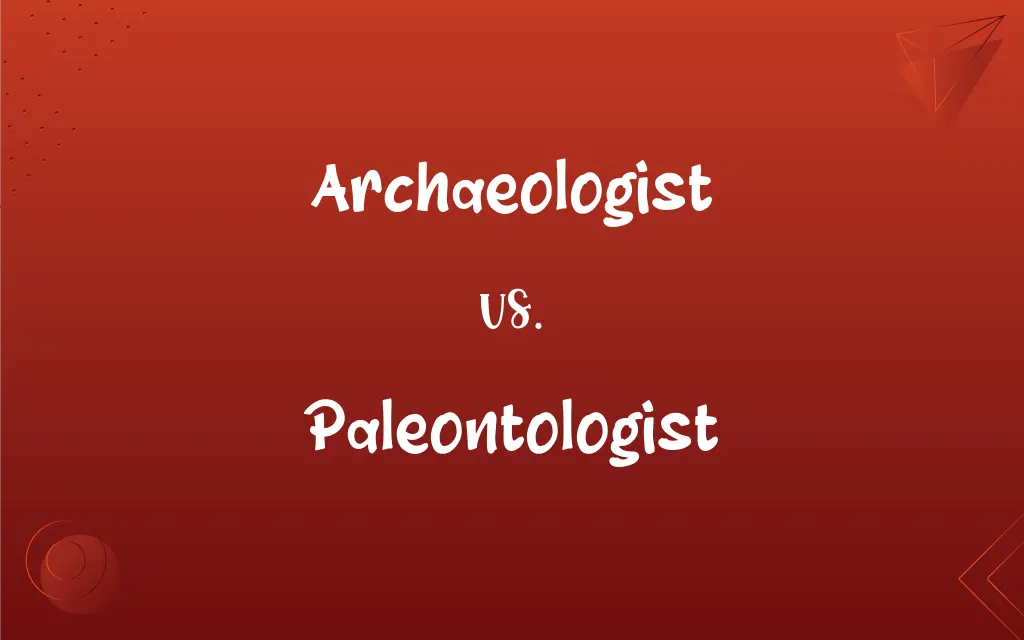Archaeologist vs. Paleontologist: What's the Difference?
Edited by Janet White || By Harlon Moss || Updated on October 21, 2023
An archaeologist studies past human cultures through artifacts, while a paleontologist studies prehistoric life, primarily through fossils.

Key Differences
An archaeologist delves into the study of ancient and recent human pasts, analyzing civilizations through their material culture. Such materials, commonly termed as 'artifacts,' include tools, pottery, and remnants of buildings, which can elucidate societal structures and practices. In contrast, a paleontologist is dedicated to understanding the history of life on Earth by examining fossils, the preserved remains or traces of plants, animals, and other organisms.
While the archaeologist's domain revolves around human activity, spanning a timeframe from the emergence of humans to contemporary periods, a paleontologist's purview transcends, encapsulating millions to billions of years, detailing the life history long before humans made their mark. This distinction underscores their different methodological approaches and the types of questions they pursue.
An interesting overlap is bioarchaeology, a subfield where archaeologists study human skeletal remains from archaeological sites to interpret human behaviors and conditions. However, paleontologists might investigate ancient hominid bones to discern evolutionary patterns, but without the same cultural emphasis an archaeologist might have.
Fundamentally, while both professions unearth the past, the nature of their inquiries diverges. Archaeologists aim to reconstruct and understand human behaviors, societies, and progressions. Conversely, paleontologists endeavor to chart the vast expanse of life on Earth, from its origins, through its evolutions, to its occasional mass extinctions.
Comparison Chart
Focus
Studies past human cultures
Studies prehistoric life
ADVERTISEMENT
Key Materials
Artifacts like tools, pottery, and structures
Fossils of plants, animals, and other organisms
Time Span
From human emergence to recent past
Millions to billions of years
Interdisciplinary Field
Bioarchaeology (studies human skeletal remains)
Paleobiology (understands ancient life processes)
Objective
Understand human behaviors, societies, and technological advancements
Chart the history and evolution of life on Earth
Archaeologist and Paleontologist Definitions
Archaeologist
An archaeologist researches ancient human civilizations through material remnants.
The archaeologist discovered tools from an ancient civilization.
ADVERTISEMENT
Paleontologist
A paleontologist examines preserved remains to chart ancient ecologies.
Through fossilized plants, the paleontologist discerned the ancient climate.
Archaeologist
An archaeologist delves into human activity from various epochs.
The archaeologist's findings shed light on a previously unknown civilization.
Paleontologist
A paleontologist deciphers life's patterns from ancient traces and imprints.
The footprints led the paleontologist to identify the creature's locomotion.
Archaeologist
An archaeologist interprets human history by analyzing unearthed artifacts.
The pottery shards led the archaeologist to insights about ancient culinary practices.
Paleontologist
A paleontologist explores the evolutionary history of organisms.
With the new fossil discovery, the paleontologist revised the reptile lineage.
Archaeologist
An archaeologist reconstructs human behaviors from discovered items.
The jewelry found by the archaeologist suggested a culture rich in craftsmanship.
Paleontologist
A paleontologist endeavors to understand life's history on Earth.
The paleontologist's research traced the evolution of marine creatures.
Archaeologist
An archaeologist aims to understand past societal structures and practices.
Through excavated structures, the archaeologist theorized the societal hierarchy.
Paleontologist
A paleontologist studies ancient life forms using fossils.
The paleontologist identified the fossil as a relic from the Jurassic period.
Archaeologist
The systematic study of past human life and culture by the recovery and examination of remaining material evidence, such as graves, buildings, tools, and pottery.
Paleontologist
The study of the forms of life existing in prehistoric or geologic times, as represented by the fossils of plants, animals, and other organisms.
Archaeologist
Someone who studies or practises archaeology.
Paleontologist
One who studies paleontology.
Archaeologist
One versed in archæology; an antiquary.
Paleontologist
One versed in paleontology.
Archaeologist
An anthropologist who studies prehistoric people and their culture
Paleontologist
A specialist in paleontology
FAQs
Where do archaeologists work?
They work at archaeological sites, museums, universities, research institutions, and cultural resource management firms.
Do archaeologists only study ancient cultures?
No, they study a range of time periods, from ancient to contemporary societies.
Why is archaeology important?
It helps us understand human history, cultural evolution, and how societies interacted with their environments.
How is archaeology different from history?
While both study the past, archaeology relies primarily on physical evidence, while history relies on written records.
What do archaeologists study?
They study artifacts, structures, and sites left by past human societies to understand their cultures, technologies, and ways of life.
Where do paleontologists work?
They work in natural history museums, universities, research institutions, and geological survey organizations.
How do you become an archaeologist?
Typically, you need a degree in archaeology or a related field and fieldwork experience.
Is Indiana Jones a real depiction of an archaeologist?
While entertaining, Indiana Jones is a fictional and exaggerated representation. Real archaeology is more methodical and less action-packed.
How do paleontology and archaeology differ?
Paleontology focuses on extinct life forms through fossils, while archaeology studies past human cultures through artifacts.
What is a paleontologist?
A paleontologist studies the history of life on Earth through the examination of fossilized plants, animals, and microorganisms.
What do paleontologists study?
They study fossils to understand the evolution, behavior, and environments of extinct organisms.
Why is paleontology important?
It provides insights into the history of life, evolutionary processes, and environmental changes over time.
Did dinosaurs and humans coexist?
No, dinosaurs went extinct about 65 million years ago, long before modern humans evolved.
What is an archaeologist?
An archaeologist studies human history and prehistory by excavating and analyzing artifacts and other physical remains.
Is archaeology a science?
Yes, archaeology uses scientific methods and theories to study the human past.
Do archaeologists only dig?
No, digging or excavation is just one aspect. They also analyze, conserve, and interpret findings.
What tools do paleontologists use?
They use tools like brushes, picks, and microscopes to excavate and study fossils.
Are all fossils studied by paleontologists very old?
While many fossils are ancient, some are relatively recent, from species that went extinct only a few thousand years ago.
How do paleontologists determine the age of fossils?
They use techniques like radiometric dating and study the stratigraphy (rock layers) where fossils are found.
How do you become a paleontologist?
Typically, you need a degree in paleontology, geology, or a related field, and often an advanced degree for research roles.
About Author
Written by
Harlon MossHarlon is a seasoned quality moderator and accomplished content writer for Difference Wiki. An alumnus of the prestigious University of California, he earned his degree in Computer Science. Leveraging his academic background, Harlon brings a meticulous and informed perspective to his work, ensuring content accuracy and excellence.
Edited by
Janet WhiteJanet White has been an esteemed writer and blogger for Difference Wiki. Holding a Master's degree in Science and Medical Journalism from the prestigious Boston University, she has consistently demonstrated her expertise and passion for her field. When she's not immersed in her work, Janet relishes her time exercising, delving into a good book, and cherishing moments with friends and family.
































































